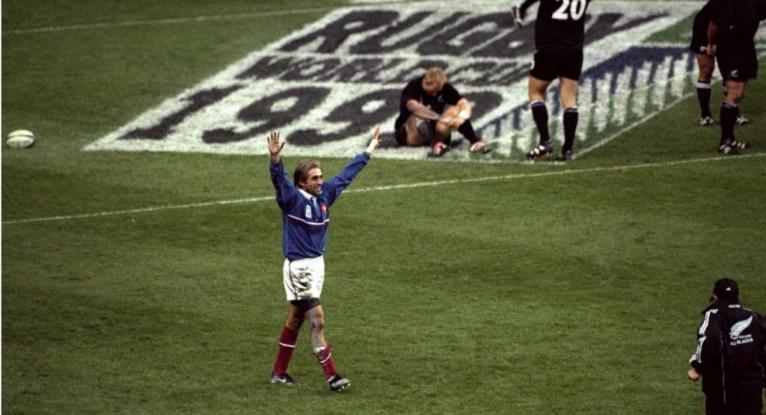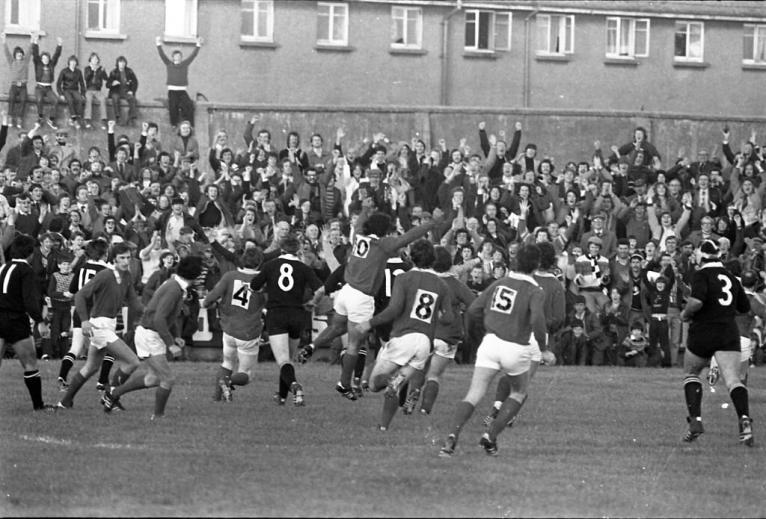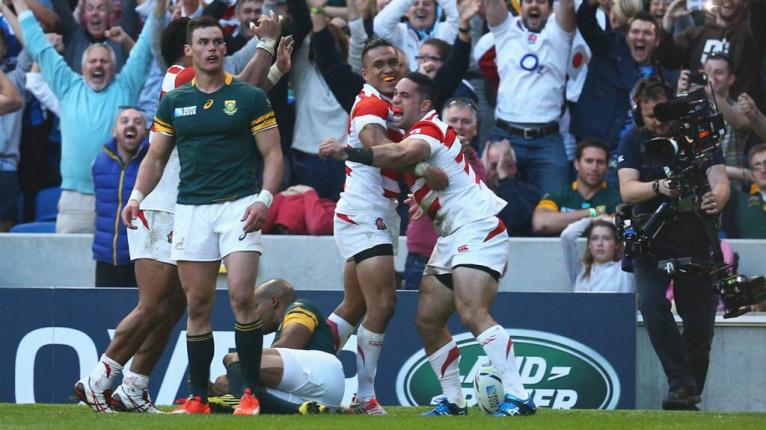Biggest ever rugby union upsets

Everyone loves a good upset.
The David Vs Goliath story never fails to attract attention and intrigue.
Let us have a look at some of the greatest ever upsets in rugby history:
3) France 43-31 New Zealand, 1999

Whilst not the biggest ever upset to have happened in world rugby, New Zealand being dumped out of the world cup by France did come across as a major shock.
The All Blacks were overwhelming favourites to lift the trophy for the second time in their history, but were undone by a French side that over the years has become quite the bogey team.
Described at the time as the greatest upset in world cup history, the game was dominated by the flying wingers from both sides. The late greats Jonah Lomu and Christophe Dominici exchanged magnificent try after try, as the two sides battered each other with every fibre of their being.
New Zealand started the strongest, taking a commanding 24-10 lead. At one stage it appeared the 1987 winners were in prime position to take their place in the final.
It was the Star of the Match, Christophe Lamaison that really turned the tide for the men in Blue. With 2 quick drop goals and 2 penalties in extremely quick succession, the French were back in the game.
As the second half moved on, the All Blacks, full of world-class superstars started to make mistake after mistake.
The classic French flair was on full display, and one try came after another. The All Blacks hopes were finally finished off with a break-away try which Philippe Bernat-Salles, the silver-haired speedster, was able to latch onto to deal the punishing blow.
The match ended France 43-31 New Zealand, subsequently ending the campaign for the All Blacks.
2) Munster 12 – 0 New Zealand, Thomond Park, 1978

It’s not often a club side will take on an international side, and after this result the famed All Blacks hope it to happen even less.
An almost full-strength New Zealand side took to Thomond Park in what was expected to be a comfortable win against the Irish province, Munster. The home side had only had a couple of warm-up matches against London opposition, one of which they got slaughtered by Middlesex County.
The All Blacks were not expecting the level of intensity that followed. Roared on by the Thomond Park crowd, the Irish side were playing as if their lives depended on it. Throwing in the most outrageous tackles, and stopping the tourists from playing their normal game. All Blacks coach, Jack Gleeson took exception to this tactic following the game:
“We were up against a team of kamikaze tacklers,” he lamented. “We set out on this tour to play 15-man rugby but if teams were to adopt the Munster approach and do all they could to stop the All Blacks from playing an attacking game, then the tour and the game would suffer.”
However it was viewed from the New Zealand perspective, there could be no doubt that this was the most famous 12-0 victory of all time.
New Zealand wing Stu Wilson stated afterwards that “We were lucky to get nil”, and also likened the match to playing in front of a crowd of 100,000, such was the noise.
1) South Africa 32-34 Japan, 2015

Up until this time, Japan were known as world rugby minnows. They had won only 1 game at rugby world cups at this time, back in 1991 in a 52-8 victory over Zimbabwe.
That victory did not signal years’ worth of plane sailing victories for the Cherrie Blossoms, in fact just 4 years later at the next version of the competition they were on the receiving end of a 17-145 thumping by the great All Blacks.
Fast forward to the 2015 world cup, Japan were headed up by veteran head coach, Eddie Jones. This appointment had proved wonders for Japan. With three years of growth for Japan, Jones reduced the number of foreign players in the squad and encouraged homegrown Japanese players to play a more exciting and expansive ‘heads up’ version of rugby.
Despite the impressive form Japan had been in, nobody expected them to perform quite as well as they did in this world cup. With Steve Borthwick as the defensive coach for Japan, the first half saw a tight defensive effort from the Japanese, going in at halftime just 2 points down.
Despite the colossal effort of the Japanese side, even die-hard fans would have been wary of putting a bet against 2-time world cup winners, South Africa.
A huge attacking effort from Japan in the second half would start to change those minds, however.
A combination of ill-discipline and a pinpoint accurate boot from Ayumu Goromaru saw Japan just 3 points behind in the final minute. Japan were awarded a penalty, but instead of taking the points, they elected for the scrum and thus aimed for the historical win.
Mere minutes later Karne Hesketh found himself on the dart for the line at the left-hand touchline, going over to win the match 34-32 for the Japanese.
This was one of 3 victories for Japan in the group stage. They were arguably unfortunate not to qualify for the quarter-finals due to a weaker points difference than both Scotland and South Africa.
4 years later Japan built on this success and went on to become unbeaten in their pool stages in their home world cup, before crashing out against South Africa in the quarter-finals in what was described at the time as South Africa’s redemption.
Since this monumental victory, the Japanese game has grown massively. By 2022, there were 125,000 Japanese rugby players, 3,631 official rugby clubs, and the Japanese national team was ranked 10th in the world.






































Comments on RugbyPass
Thanks for the write up. Great to see the Rebs winning, I am a little interested in how they will go against the remaining kiwi teams, I think they’ve only played Hurricanes and Highlanders but how great to see these players performing!! I also see Parling has a job beyond June 30! A good move by RA? Also how do you fix the Rebels previously scratchy defence?
81 Go to commentsbe smart - go black
13 Go to commentsNext week the Crusaders hopefully have Scott Barrett back. Will be great to have the captain back. Hopefully he will be the All Black captain as well.
12 Go to commentsExciting place to be for the young fella. I expected he was French Polynesian when I saw him included in the France 6N squad (after seeing him in NZs), and therefor be strong grounds we might loose him to rugby down here. Good, in that he is good enough to warrant such a profile, and from a journalism’s fan interaction aspect, to finally get a back ground story on the fella. Hope he has settled into NZ OK and that at least one rugby country will fit with him to help his development, which, if so, he should surely continue for a few years, and then that he can experience France to it’s fullest with a bit more maturity and less reliance on family than you would have at his current age. A good 3 or 4 years before he would be ready for International duty if he wanted to wait. Of course he already sounds good enough to accept a call up, and to cap himself, in the more immediate future (he’d have to be very very good in the case of the ABs), and he’ll get a great taste of that being with the Canes who have a bunch who are just a few years further into their career and looking likely Internationals themselves.
13 Go to commentsI remember towards the end of the original broadcasting deal for Super rugby with Newscorp that there was talk about the competition expanding to improve negotiations for more money - more content, more cash. Professional rugby was still in its infancy then and I held an opposing view that if Super rugby was a truly valuable competition then it should attract more broadcasters to bid for the rights, thereby increasing the value without needing to add more teams and games. Unfortunately since the game turned professional, the tension between club, talent and country has only grown further. I would argue we’re already at a point in time where the present is the future. The only international competitions that matter are 6N, RC and RWC. The inter-hemisphere tours are only developmental for those competitions. The games that increasingly matter more to fans, sponsors and broadcasters are between the clubs. Particularly for European fans, there are multiple competitions to follow your teams fortunes every week. SA is not Europe but competes in a single continental competition, so the travel component will always be an impediment. It was worse in the bloated days of Super rugby when teams traversed between four continents - Africa, America, Asia and Australia. The percentage of players who represent their country is less than 5% of the professional player base, so the sense of sacrifice isn’t as strong a motivation for the rest who are more focused on playing professional rugby and earning as much from their body as they can. Rugby like cricket created the conundrum it’s constantly fighting a losing battle with.
3 Go to commentsOh wow… “But as La Rochelle proved in winning in Cape Town this season, a cross-continental away assignment need not spell the end of days.” La Rochelle actually proved quite the opposite. After traveling to Cape town and back they (back-to-back and current champs) got mercilessly thumped the next week. If travel is not the reason, why else would a full-strength powerhouse like La Rochelle get dumped on their @r$e$ one week later?
26 Go to commentsYou know he can land a winning conversion after the full time siren is up. (Even if it takes two attempts.)
5 Go to commentsA very insightful article from Jake. I would love to know how South African’s feel about their move to Europe. Do you prefer playing in Europe or want to go back to Super Rugby?
3 Go to commentspure fire
1 Go to commentsA very well thought out summary of all the relevant complications…agree with your ”refer the Cricket Test versus 20/20 comparison”. More also definitely doesn't necessarily mean better!
3 Go to commentsMust be something when you are only 19 y.o and both NZ and France want you. Btw he wasn’t the only new caledonian in french U20 as Robin Couly also lived in Noumea until 17. Hope he’s successful wherever he chooses to play.
13 Go to comments“Several key players in the Stade Rochelais squad are in their thirties” South Africans are going to hate the implications of that comment!
5 Go to commentsI know Leinster did a job on La Roche but shortly after HT Leinster were 30-13 ahead of them and at a similar time Toulouse were trailing Exeter. At 60 mins Leinster were 27 ahead but after 67 mins Toulouse were only 19 ahead before Exeter collapsed. That’s heavier scoring by Leinster against the Champions. I think people are looking at Toulouses total a little too much. I also think Northhampton are in with a real chance, albeit I’d put Leinster as favourites. If Leinster make the final I expect them to win by more than ten and with control.
5 Go to commentsHey Nick, your match analysis is decent but the top and tail not so much, a bit more random. For a start there’s a seismic difference in regenerating any club side over a test team. EJ pretty much had to urinate with the appendage he’d been given at test level whereas club success is impacted hugely by the budget. Look no further than Boudjellal’s Toulon project for a perfect example. The set ups at La Rochelle and Leinster are like chalk and cheese and you are correct that Leinster are ahead. Leinster are not just slightly ahead though, they are light years ahead on their plans, with the next gen champions cup team already blooded, seasoned and developing at speed from their time manning the fort in the URC while the cream play CC and tests. They have engineered a strong talent conveyor belt into their system, supported by private money funnelled into a couple of Leinster private schools. The really smart move from Leinster and the IRFU however is maximising the Irish Revenue tax breaks (tax relief on the best 10 years earnings refunded at retirement) to help keep all of their stars in Ireland and happy, while simultaneously funding marquee players consistently. And of course Barrett is the latest example. But in no way is he a “replacement for Henshaw”, he’s only there for one season!!! As for Rob Baxter, the best advice you can give him is to start lobbying Parliament and HMRC for a similar state subsidy, but don’t hold your breath… One thing Cullen has been very smart with is his coaching team. Very quickly he realised his need to supplement his skills, there was talk of him exiting after his first couple of years but he was extremely shrewd bringing in Lancaster and now Nienaber. That has worked superbly and added a layer that really has made a tangible difference. Apart from that you were bang on the money… 😉😂
5 Go to commentsNot sure exactly what went wrong for him at Glasgow but it’s pretty clear he ain’t Franco’s cup of tea. Suspect he would have been better served heading out of Scotland around the same time as Finn, Hoggy and Jonny!
1 Go to commentsBulls disrespected the Northampton supporters and the competition. Decide quickly, fully in or out.
26 Go to commentsI wonder if Parling was ever on England’s radar as a coach? Obviously Borthwick is a great lineout coach, but I do worry he might be taking on too much as both head coach and forwards coach.
1 Go to commentsJason Jenkins has one cap. When Etzebeth was his age he had over 80 caps. Experience matters. He will never amount to what Etzebeth has because he hasn’t been developed as an international player.
2 Go to commentsSays much about the player picking this gig over the easier and bigger rewards offered to him in Japan. Also says a lot about the state sanctioned tax benefits the Irish Revenue offers pro rugby players, with their ten highest earning years subject to an additional 40% tax relief and paid as a lump sum, in cash, at retirement. Certainly helps Leinster line up the financial ducks in a row to fund marquee signings like this!!! No other union anywhere in world rugby benefits from this kind of lucrative financial sponsorship from their government…
5 Go to commentsTrue Jordie could earn a lot more in Japan. But by choosing Leinster he’ll be playing with 1 of the best clubs in the world and can win a champions cup and URC…..
6 Go to comments